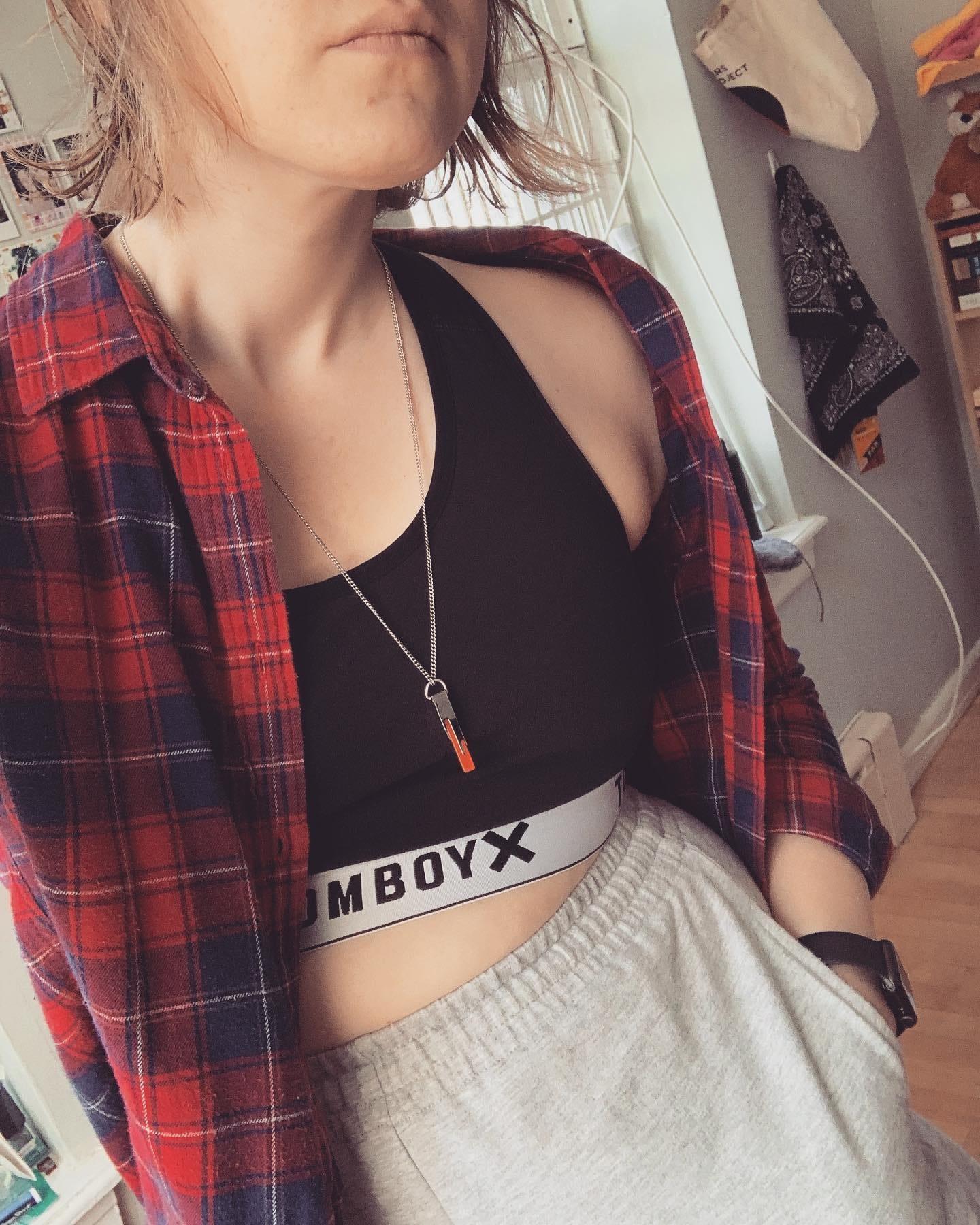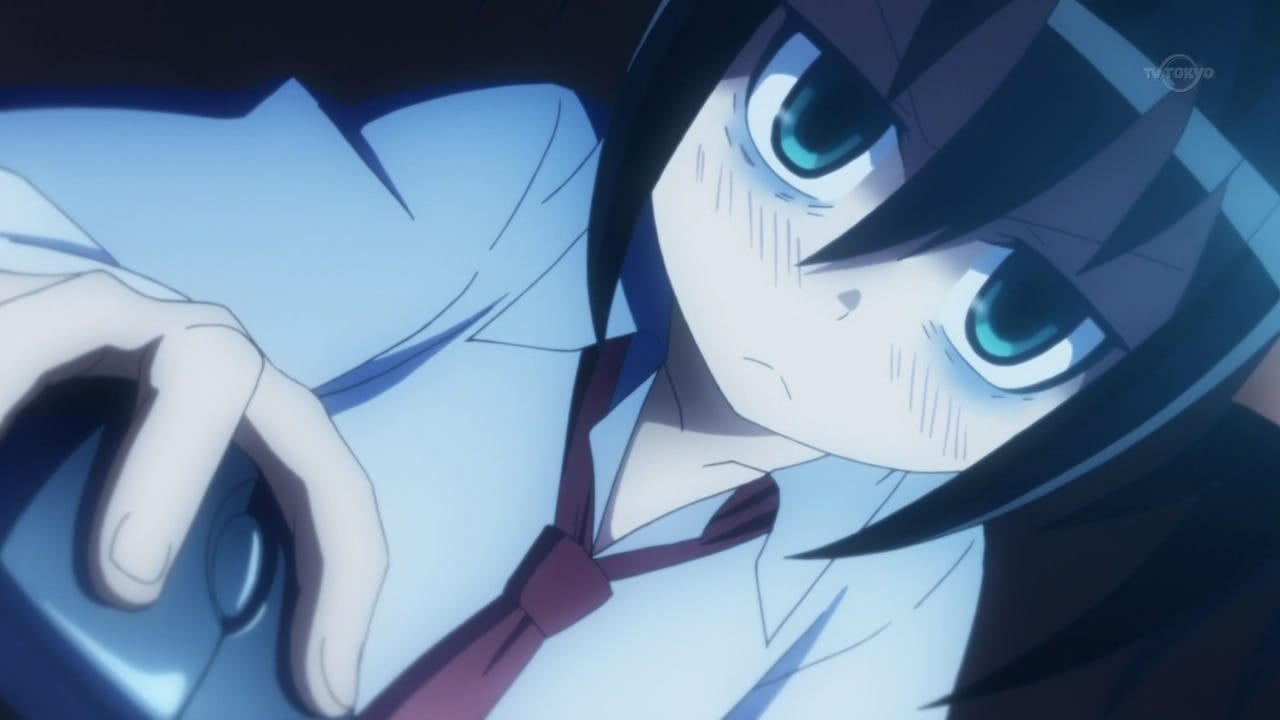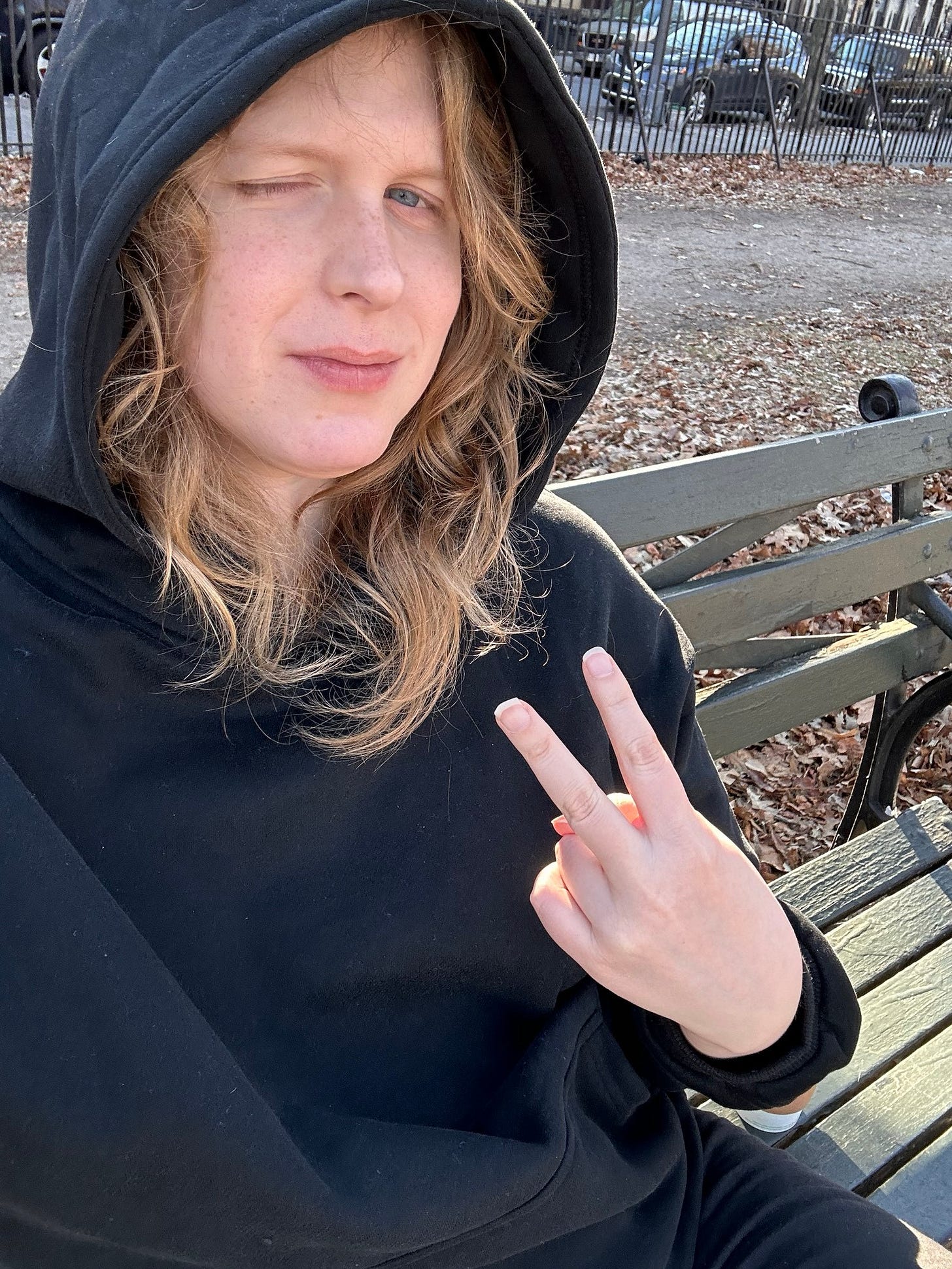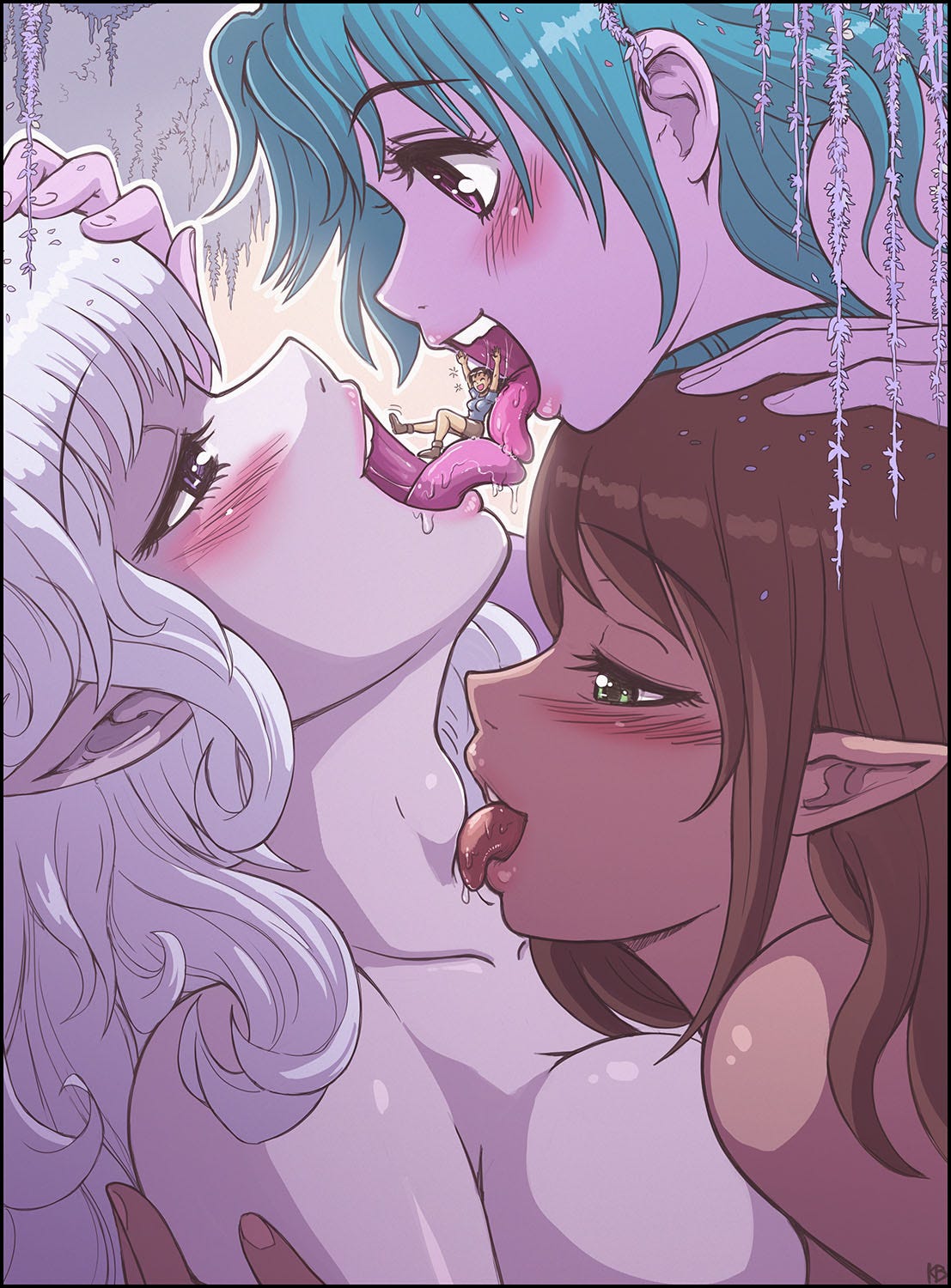the first crack in the veneer for me, the thing that began the slow and gradual exposure of my real self, was learning i was unfuckable
right when i was about to move, i started going to parties in brooklyn. weeby parties where we would all get sloshed and high and dance to 2000s anime music and go home crossfaded. it was casual and chill, classic new york millennial house party vibes. fun, fun, fun. i was one of the only transfems at these parties, one of two or three, but everyone treated me fine. no one acted weird toward me, esp not at the femme and nonbinary hang. everyone seemed happy to see me, enjoyed my presence. a floater who got to vibe and chill and joke and have fun
i felt like i fit right in. finally found my people
then. something changed when i started introducing my cis girl friends into the friend group. my friends got attention. i mean, i did too, but in the way you do when people like your jokes. these women, they got attention attention. people came up to them to talk to them. chat with them. seemed to spend a lot of time around them. wanting something from them
oh, i soon realized. they were trying to fuck them
huh
that happens here?
woah
that never happened to me
“i think it’s because youre a lesbian,” one of my cis girl friends said. “the guys there dont approach you because they know youre gay”
maybe, i thought. but i didnt buy it. the guys at these parties werent super woke, just the regular kind. like, you know, faux woke. pronouns in bio but two white claws and they started acting strange. if they liked what they saw, they would have made it a little more than obvious
i kept hanging out, kept going out to party. but now i was curious. i paid a little closer attention. started listening a little more intensely to peoples’ personal histories, keeping track of who dated whom and how it went down
a pattern emerged. a pattern that i shall now call The Weeb Party Rule. it pertains to guys dating girls and girls dating guys and girls dating girls and all sorts of other things. in the order of the rules’ formation
The Weeb Party Rule
first, women mostly dated men
second, if i brought a woman with me, they were guaranteed to get attention from somebody there. usually men
third, queer women there were likely to check out other women and gossip about being attracted to them. ditto toward nonbinary people
fourth, the aforementioned rules only pertained to cis women and AFAB nonbinary partygoers
fifth, transfems were welcome to engage in socializing, but dating was off limits
the Weeb Party pieces started coming together. cis women at these parties were mostly interested in cis men. their queer desires were mostly reserved for cis women and nonbinary people that they thought were AFAB
meanwhile, men did not approach trans women for sex or dating, but men did approach cis women and nonbinary AFAB people for sure. and while cis women tended to ogle the other cis women there (and by extension, force AFAB nonbinary individuals into the cis woman box1), they didnt seem to have much interest with transfems
it was like all the cis men and all the cis women were interested in all the other cis women and cis men and anyone they perceived to be a cis woman subconsciously
oh no, i thought to myself
i dont think i fit in
I don’t think I fit in at all.
Attraction

When I first moved to NYC (2016 - 2020), I was in a Brooklyn trans girl community made up of writers and musicians and other creators. A twinky, thin-ish blonde girl with curves in all the right places? Yeah, my first four years in New York were busy. A revolving door of sexual partners, one after another. Threesomes, couple swaps, sex parties, tgirls fucking me to compare notes with other tgirls. For the first time in my life, I felt hot. Attractive. Sexual. And not just sexually appealing, but sexually appealing to other women.
Yes, other trans women more specifically, but I assumed there wasn’t that much of a difference between cis women and trans women when it came to openly expressing queer attraction.2
The fun had to end eventually. 2020 loomed, and being ogled by other trans girls had worn out its welcome. I was typecasted as “hot journalist tgirl,” and I felt trapped in a setting where sexual availability was expected from me. Confused, oddly unsatisfied with most of the sex I was having, I didn’t know what to do. Was I ace? Increasingly, I was questioning whether I was ace.
It was clear I needed a sexual break.
When I made the switch to Weeb Party friends, I took it on spec that they were far less sexual. The opposite of a T4T space, a place where I was integrating with more cisgender people on purpose to become familiar with life outside of community.3 Socially mature, a curated friend circle of working professionals where everyone kept it in their pants. We were all either in our 30s or hitting our 30s, it felt like a great landing spot from my slutty 20s. I mean, I wanted to take a break from sucking and fucking, so I chose a place that seemed relatively tame.
But I think I drew an assumption based on the sucking and fucking available to me at the time. As I paid closer attention, I realized that I was having an asexual social experience. But others were not.
“Eh, Not Into Trannies”
I assume most trans women have read Them’s 2018 article on discrimination against transgender people in dating. According to a study in the Journal of Social and Personal Relationships, just a mere 12 percent of 958 surveyed said they were open to dating a transgender man or transgender woman. Nearly half of all queer and nonbinary participants were exclusionary toward trans partners, as were 71 percent of lesbian women.
Between trans men and trans women, the latter were more likely to face rejection from dating pools than the former.

While this data is seven years old4, it’s an important starting point for understanding the issue I had with Weeb Party. What I was going up against was prejudice in preferences: Cis women in Weeb Party were getting massive amounts of attention, but trans women were not.5
Let’s say there were roughly 50 people at Weeb Party gatherings from 2021 through 2024. Let’s assume very little changed in the social climate within that millennial friend group across those three years (although it’s safe to say a larger social climate antagonistic to trans people would also affect a social circle’s dynamics). Let’s also estimate that 4 partygoers at all events were lesbians and 5 were queer.
Based on the 2018 study, while attending the average Weeb Party party:
Only 6 people in total at a party were open to dating a trans person
Only 2 or 3 queer people at a party were open to dating a trans person
Only 1 or 2 lesbians at a party were open to dating a trans person
If I was one of those 6 open to dating a trans person, one of those 2 or 3 queer people, and one of those 1 or 2 lesbians… no wonder why I was feeling so left out. Look how small my dating pool was! Most of the lesbians there were statistically unlikely to be interested in me, and a good chunk of the queer folks there would have passed as well. Even if I was open to dating men, 44 people would have said no to being with a trans person.
Statistically speaking, I was in a social climate where I was surrounded by cis people who looked me over and said “eh, not into trannies.” When faced with the real thing, they’d rather leave the dickgirl fantasy to futanari hentai.
NEETcore
Now, I’m not necessarily saying that all rejection or lack of interest I faced in the Weeb Party friend circle was solely because I am a transgender woman. I think I was not a suitable candidate in that theoretical dating market for a wide assortment of reasons. A lot of people in that space were early 30s, working professionals, and lived pretty respectable lives. Drinking and dancing to anime music was one of the weirder things they did with their free time.
Compare that to an out and proud kinkster, someone who is pretty upfront about her interest in BDSM and prefers open relationships for that reason. A lesbian living a rather alternative lifestyle (you know, being a sex-working sex journalist), someone who speaks her mind pretty openly and brazenly. Some people probably didn’t fuck with my personality. Or maybe I wasn’t their type physically.6 And yes, for the record, I did know of some people who thought I was attractive within that friend group too. It didn’t necessarily mean we would date, it just meant I bumped into one of the other 5 people there who would consider being with a trans person.
That’s the problem though. “6 people open to dating a trans person” does not mean “5 potential partners.” You may not be into those other 5 people. Or there may be chemistry between you and one of the other 5, but the circumstances may not be right: They’re partnered, uninterested in sex or dating at that time, or your sexual orientations may be incompatible.
In other words, not all of my experiences at Weeb Party can be framed through my gender identity. But when cishet-leaning dating patterns emerge, and trans women seem to receive significant less attention than their cisgender equivalents or cisgender men? Yeah, it’s hard to believe that’s a space where trans women are truly treated as equals.7
This planted a seed in me that grew over a year and a half. Finally one day, it ruptured. I realized Weeb Party friend group had an undercurrent of transmisogyny within it that had gone unaddressed8. I looked for it, and I found it. My experiences with its dating pool (or lack thereof) was one such reflection of that.
I felt disillusioned and alienated after this conclusion, so I decided to take stock. I looked in the mirror and asked, “well, what was I getting out of Weeb Party?”
I felt like I was looking for sexual attention that I wasn’t getting. I was looking for romantic and sexual partners again, and the space would not provide that to me because few people there wanted me sexually nor romantically. Even from men, there was no sexual validation, no feeling I was attractive
I felt like I was running from my social anxiety and agoraphobia instead of accepting my disabilities. I was pushing myself to hang out IRL when my mind and body were begging for rest from a taxing social space
I felt like I was dressing to look attractive and cool in a space where I was never going to be treated as desirable, as an equal. I was putting in effort wasted on others, because people didn’t care what I looked like. I was unfuckable
Something broke within me. What was the point of all this? What was I doing here? Why did I keep hanging out if I wasn’t really wanted?! The last party I went to, I wore a dress for the first time in a very long time. I traded in slacks and jeans for something pretty. Something form-fitting, pretty, feminine. No one noticed, no one complimented me on it.
My mood soured.
Dazed, confused, tired. Barely processing half of what was going on around me, I think I might have been dissociating a bit to protect myself from a social setting where I did not belong. I smoked some weed and went home early.
A dam broke within me. I wasn’t being respected. That’s what was going on. And well, if the world wasn’t going to treat me with respect, I wouldn’t treat it with respect either. I began adopting what I like to call NEETcore: Hoodies, sweatpants, anime shirts, whatever makes me feel comfy when I go out. An expression of anti, a fashion that isn’t fashionable. A statement that I appear as myself and prioritize my comfort over the preferences of anyone else. I can dress nicely again when I want to dress nicely for me. Right now, I want to dress like I just got out of bed. That means anime tees, baggy sweatpants, and Vans.9
It’s funny, reinventing yourself. It’s not very glamorous. The true me is frumpy and agoraphobic. She stays home and plays Deadlock all day and pretends to be a giant anime girl over the internet. To my utter bewilderment, this is considered very attractive to a wide assortment of people. Cis women, trans women, nonbinary people; I sometimes find myself laying in bed all day, ERPing with multiple play partners across 24 hours. It’s like I’m catching up for lost time hanging out with Weeb Party. Quite literally, as I’ve had more cis partners in the past three years than in the four before that.
Which begs the question. Why the fuck should a woman that dresses like this?
Get more attention than one that dressed like this?
It’s not a matter of appearance. It’s a matter of respect. As it turns out, being open-minded, generous, and kind to people who respect you tends to lead to good things with people who actually treat you as an equal.
Gen Z Vore
To explain this, I will introduce a counter to The Weeb Party Rule. I call this The Vore Rule.
After I left the Weeb Party friend circle, I began forming new friends from a mix of places: VTubing, lewdtubing, the size fetish world (that is, people into giantesses), the vore community, various kinky nerdy queer-adjacent spaces, and so on. The original metamorphosis that began during “Goddess Sex” completed; my new friends are best described as “gay nerdy kinksters.” Certified queer NEETs and hikikis, lesbo content creators and WLW VTubing sex workers, people who spent New Years Eve in VRChat or playing video games. I like my new friends.
In light of this, The Vore Rule emerged to explain my experience:
The Vore Rule
Your average queer nerdy kink, size, and vore online spaces are likely filled with people who
feel a bit estranged from offline life
have done a bit of questioning about the world because they feel estranged
are (relatively) more open minded about sexual and dating preferences after exposure to non-normative genders and sexualities in kink
are looking for non-traditional desires to be met and thus are open to non-traditional people and relationships
come from a wide assortment of life experiences but all seek out similar things online, making it a melting pot where millennial and Gen Z adults can interact
Weeb Party friend group was a millennial friend group. Everyone there was either a millennial, or more or less on the line between Gen Z and millennial. They were also relatively well adjusted to normalcy, to IRL socializing, albeit they also had varying levels of queer immersion and comfort. This produced a negative experience for me, and it reminded me of a few one-off poor encounters I had with millennial cis women in 2016 to 2020.
In other words, my experiences with being ignored or looked over in a dating space reflected negative experiences I had with cis millennials who wanted to reject me for my gender identity but couldn’t (a common theme in the 2010s and something I experienced as recently as 2020). This led me to believe it may be an issue, generationally, with how millennial cis women perceive trans women.
On average, Gen Z has treated me better than millennials. I don’t just mean that Gen Z adults are generally more open to having sex with trans women than their millennial counterparts. I mean that Gen Z cis women treat me as if I am an equal to them. While millennials are more likely to treat me like a third sex woman, a massive amount of Gen Z’ers view trans women as women. They have accepted transness as just another aspect a woman may have.
This has resulted in not just a lot of positive experiences with Gen Z queer women in my sex and dating life, but affirming experiences even when conflict happens. It never feels like my transness is at play if there’s a fight. It just feels like we’re two equals figuring things out.
I’m curious if there’s a huge gap between dating preferences for millennials and dating preferences for Gen Z. Moving from a T4T space to a C4C one was an immense form of psychological whiplash. But moving from Weeb Party to a collection of cis and trans friends sexually interested in me? That, too, gave me whiplash. And it solidified my feeling that Weeb Party’s vibe was not the right fit for me.
NEET Goddess Sex
“Goddess Sex” was a very difficult essay to write because it is about alienation, the occult, and the traumatic event that served as a catalyst to both. “NEET sex” was (is?) difficult too, but because it’s dramatic and intense in a quiet sort of way. It’s about the unfun part in changing yourself, the day-to-day pains of a trans woman figuring out her place in the world. When you realize you’ve found yourself in the same place that you were before: Trying to fit in, believing you’ve discovered the right place or right people, and then having the illusion come crashing down. There’s nothing that can be done except cut ties, move on, start over. The growth and change comes from accepting it’s time to go.
The hard and heavy feelings are still very raw for me, of course. This is one friend group breakup that I’ve had to do alone, without other people leaving, validating my experiences, saying, “hey, I experienced something messed up too.” It’s a very strange situation, too, in that I do believe something transmisogynistic happened… but I’m still friends with a number of people who do Weeb Party stuff. And I still have respect for the hosts, still have a lot of fond memories, feel like many of the people I met there saved my life during the course of Goddess Sex’s narrative.
Am I angry? I don’t know. Maybe just disappointed things worked out the way they did.
Weeb Party wasn’t good for me because the circumstances were wrong for me. One of those circumstances was being transgender, but not the only one. It was a friend circle where I was trying to fit in and be normal to my own detriment. A quiet kind of self-harm. And I hit a limit. For being a trans woman, a sex worker, a kinky dyke, all those things. There’s a ceiling for how much you can be yourself in a friend group. Patience runs out from some people.
So go find new people.
During those times when you're just stuck for an answer, making a mistake is one method of unsticking yourself. Madoka, you've grown up to be a good kid. You don't tell lies, and you don't do bad things. You're a girl who works hard at what she thinks is right. You get an ‘A’ as a child. So before you become an adult, you have to start practicing falling down.
a sort of quiet, insidious misgendering
It’s more accurate to say that there’s a difference between millennial and Gen Z relationships with trans womanhood, which this essay discusses later on
I did not yet process that a C4C space can exist
New information is hard to come by given a general lack of interest in sociological studies regarding trans women’s experiences with sex and dating
Receiving sexual attention isn’t necessarily a thing people want to have happen to them when they go out and party. But a suspicious absence of it can be a form of benevolent transmisogyny: The “privilege” of having no wandering eyes on your body reflects a dating landscape that suggests trans women are not viable romantic nor sexual partners. Which, after repeated exposure, can become alienating and depressing
Penis aside
A transphobic dating pool may reflect badly on the capabilities to curate and develop a social space, but let’s put things into perspective. “Cis friend group that wouldn’t date a trans woman” is pretty standard
There are additional reasons for this conclusion that are not appropriate nor applicable for this essay
I sometimes get misgendered more, but it’s still pretty rare










